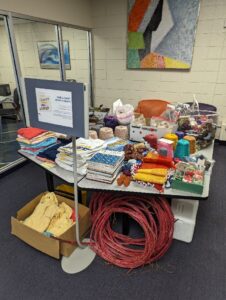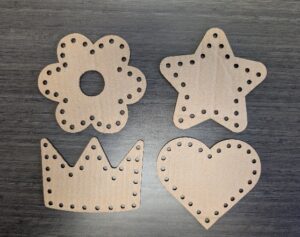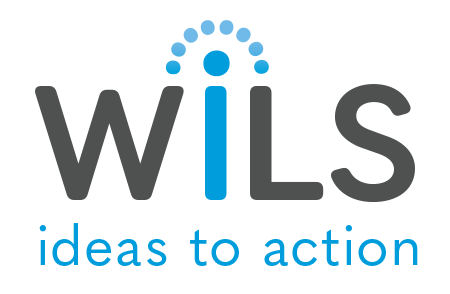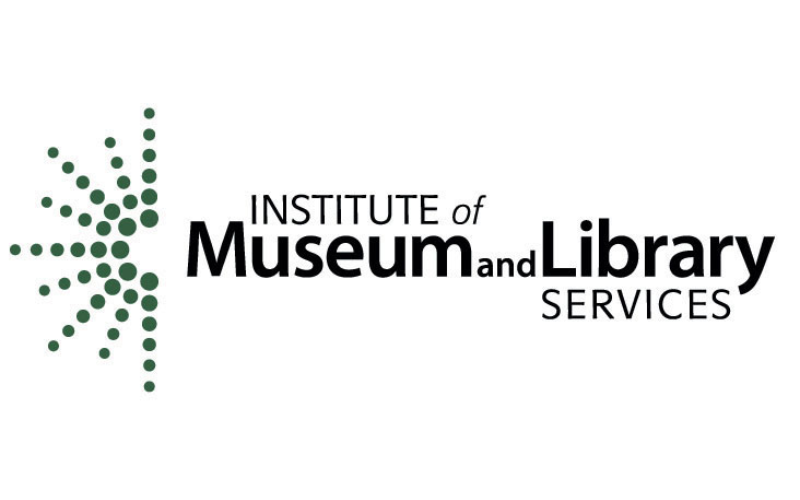by Jenna Vande Zande (she/her), User Services / Outreach, UW-Eau Claire McIntyre Library
You grab one of your favorite flannel shirts out of the closet, maybe one you haven’t worn in a while.
You pull it off the hanger, pull the one arm through one sleeve, then the second, then RIIIIIIIIIP.
Crap. You survey the damage. It’s just a popped seam in the armpit, no biggie. No one will even notice, your arms will be down most of the day.
Then you reach for the buttons. Or, where two of the buttons used to be.
And then, the shirt is off, to sit in the household mending pile until someone has time to pull this shirt together, back to proper working order.
Sometimes it can be hard to get motivated to fix your belongings, even when you really, really love something – like that flannel shirt. The staff and faculty of the Blugold Makerspace have seen how important community can be for makers. Since opening in 2018, we have watched many things come through our doors in need of repair. Pant hems, laptop hinges, glasses (a lot of pairs of glasses), and even a mascot costume’s derrière. We ourselves have fixed several problems for the library using the makerspace, from as small a fix as 3D printing the center spool in a tape dispenser, to repairing the office chairs. But even with all our collective expertise of tinkering, we know there are plenty of people out there with a vast array of knowledge, and we needed to get connected.

Which is where the Eau Claire Repair Fair began. We wanted to find a way to bring together UW-Eau Claire students, staff, and faculty with the local community and find our community of experts, makers, upcyclers, tinkerers, and people who maybe ‘just fart around in the garage sometimes’ (but really have something like 40+ years of woodworking experience).
By bringing together this community of like-minded, passionate people, it can inspire a world of possibilities. Already through the planning process of this year’s EC Repair Fair, the Blugold Makerspace has made some exciting connections. Our planning team has been invited to participate in a large Earth Day event in 2026, as well as assist with a new think tank on campus about reclaiming and recycling textiles. These are exactly the kind of connections and projects we hope to inspire by gathering people together for our event.
Our planning team has been steadily working through our contact list of friends, family, and local businesses. Since the event itself has a fairly broad scope, it is easier to include a greater variety of volunteers. We have invited groups like our local electronic recycling center, Habitat for Humanity, and hardware store chains. We also reached out to our local senior center and various woodworking guilds. What has been particularly helpful is word of mouth, as many makers in specialized circles know each other. While some volunteers have regretfully declined this year’s event due to conflicts, they have eagerly stated they are interested in future repair fairs. Nearly everyone in our planning team has talked to someone about the event and had them say some iteration of “hey, now THAT is a good idea” – so we think we are on the right track!
Our current goal is twofold: a vendor fair with different stations, and a series of workshops or demonstrations. We offer ideas to our volunteers but ultimately let them take the lead on how they want to participate. Some feel more comfortable connecting with possible customers and discussing specific repairs and have the time to spend the full day at the vendor fair. Some volunteers would prefer to lead a scheduled workshop or demonstration and then leave materials for attendees to take to connect after the Repair Fair. We have a large ballroom reserved in our student union for the event, and we plan to line the walls with our experts, so they are close to outlets and natural light. In the center of the room, we are creating large tables for attendees to gather. One area will be for sewing and mending, one for electronics, and another for kids’ activities.

Something that was important to the planning team was a variety of activities to make the event appeal to all ages. Little ones with their grown up can learn the basic mechanics of sewing using our cardboard templates, or color one of our recycled cardboard creations of famous mini artworks or Pokémon. Older makers can join the sewing circle to learn how to sew on a button or repair a seam, or the electronics table for an ‘equipment autopsy’ where we take apart household appliances.
A Blugold Makerspace classic that will be moved from the library to the Repair Fair for one day only is our famous Craft Swap. Try something new, but it wasn’t for you? Donate the supplies to the Craft Swap! We are always collecting fabric, coloring supplies, yarn, canvases, and more for the Blugold Makerspace, but anything we can’t keep for whatever reason, we supply for our library users during our regular open hours. You may find your new favorite hobby! Donations are not required to take an item, but they are encouraged. Because the Craft Swap works on an honor system, we do get some interesting donations (or, donations arranged in interesting ways – we see you, felt letters). Besides yarn, fabric, etc., we collect things you wouldn’t expect. Some of the more popular donations are recycled tri-fold poster boards for presentations, half completed art projects, puzzles missing pieces, or a really, really good box. Having the Swap connected with the Makerspace has also helped many of our students who face financial hardship the ability to continue their class projects or use materials to repair something they own!
With the amazing support from WiLS, we intended Year 1 of the EC Repair Fair to be a growth and learning year. We wanted to get our feet wet with the process of a public repair event and meet some amazing folks, and we have absolutely done that so far. We are excited for the event this year, and all the amazing community building we have yet to come. We also wanted to document what we learned so other libraries can use the information to create their own Repair Fair, big or small. Every item repaired or repurposed was worth the time it took to get it back to a usable state.
Sure, you could argue, what’s one shirt? We could host a repair fair in every city, every month, forever, and still have stuff to throw away.
Think of it this way. There are over 330 million adults in the US. If everyone fixed, or helped someone else fix, even one flannel in their mending pile, there would be 330 million fewer shirts in the landfills.
Find your repair community and start with your shirt. A little, over many, makes much.



